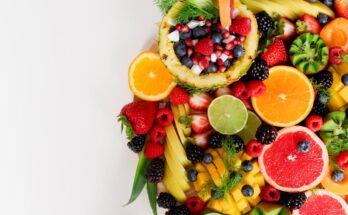Introduction to Pregnancy Nutrition Proper nutrition, of both mother and child, is of paramount importance. A well-balanced diet can provide the fetus with those essential nutrients while assuring the mother of her well-being and energy during this period. Some nutrients, vitamins and minerals take on the central stage due to their importance during this period. Knowledge of nutritional requirements will lend insight into a smooth pregnancy and healthy offspring.
Key Nutrients A healthy pregnancy calls for enhanced quantities of particular nutrients to support the baby comes to full term as well as prepare the mother for delivery. The critical nutrients are as follows:
1. Folic acid: Folic acid, or folate, plays an important role in the development of the baby’s brain and spinal cord. Most importantly, folate aids in the prevention of neural tube defects, such as spina bifida. Women are recommended to take no less than 400-600 micrograms (mcg) of folic acid every day when they are pregnant. Sources of folate include leafy greens, legumes, and fortified cereals.
2. Iron: Iron is important for an increase in blood volume that will happen during pregnancy and will aid in the prevention of anemia, which would make the mother tired and result in complications. By including iron-rich foods, such as lean meats, beans, lentils, and fortified cereals, with vitamin-C rich foods, such as oranges, the absorption of iron will be enhanced.
3. Calcium is elemental in developing the bones and teeth of a baby and protects the mother against loss of calcium from the bones. Pregnant women are recommended to take about 1,000 milligrams of calcium daily, such as that found in dairy products or fortified plant milk, leafy greens, and tofu.
4. Protein helps to develop the baby’s muscles, tissues, and organs, and pregnant women should take about 70 grams of protein daily. Good sources are lean meats, fish, eggs, legumes, nuts, and dairy products.
5. Omega 3 fatty acids, specifically DHA or docosahexaenoic acid, are medically required in the development of the brain and the eyes of the baby. Some examples of foods that are great sources of Omega 3s include fatty fish, such as salmon and sardines, and flaxseeds, nuts, and chia seeds. It is desirable that the pregnant woman consumes 200 mg of DHA per day.
6. Vitamin D facilitates absorption of calcium and the development of bone health in the mother and baby. The sun is the primary source of Vitamin D. It can be found in fortified milk, fatty fish, and eggs. It is recommended between 600 IU per day during pregnancy.
7. Fiber Pregnancy Constipation Is Extremely Common: Adequate intake of fiber is essential. Fruits, vegetables, whole grains, and legumes comprise great fiber sources that ensure digestive health.
Foods a Woman Must Eat In Pregnancy To optimize intake of nutrients in a complete manner, some healthy eating choices for pregnant women include the following:
. Fruits and Veggies: Go for all shades and varieties, as the more colors one eats, the more vitamins and minerals incorporated.
. Whole Grains Brown rice, oats, whole-wheat bread, and quinoa: an excellent source of fiber, B vitamins, and iron.
. Lean Proteins: Chicken, turkey, eggs, tofu, or fish are great protein sources.
. Healthy Fats: Avocado, olive oil, nuts, and seeds contain essential fatty acids.
. Dairy or Dairy Alternatives: Milk, yogurt, and cheese or fortified plant-based alternatives, including calcium, vitamin D, and protein.
Foods and Substances To avoid Pregnancy Some foods are dangerous to this tiny kid and can include limited consumption or avoiding them altogether:
1. Raw or Undercooked Meat: These can contain harmful bacteria that could lead to foodborne illness.
2. High-Mercury Fish: Fish such as shark, swordfish, king mackerel, and tilefish, being sources of high levels of mercury, should be avoided.
3. Unpasteurized Dairy: They may carry listeria, a bacterium that is very dangerous to the child.
4. Caffeine: Limit caffeine to 200 mg or less per day, as large doses may impact the baby’s growth.
5. Alcohol: No amount of alcohol is safe in pregnancy, and exposure to it can lead to fetal alcohol syndrome and other developmental disorders.
Managing Common Pregnancy Obstetrics And Nutritional Challenges
Nausea and Morning Sickness: Smaller, frequent meals with bland foods like crackers and ginger may alleviate nausea. Staying hydrated is also of utmost importance.
Heartburn: Avoid excessive spicy and acidic foods and smaller meal times.
Constipation: Fiber supplementation and adequate hydration can relieve constipation. Regular activity such as walking might aid prevention as well.
Prenatal Vitamins: In some cases, prenatal vitamins are recommended to prevent certain nutrition deficiencies, particularly folic acid, iron, and DHA. Though all nutrients are readily available in food, supplements can assure some immunity in certain contexts and must be used in the context of a doctor’s recommendation.
Conclusion
Proper nutrition is the basis for a healthy pregnancy; therefore, pregnancy nutrition has been given special importance in terms of the health of the mother and the birth of a healthy baby. Diets should be tailored to remain as great of a nutritionally supportive environment for the developing baby. The balance of diet with prenatal supplementation and lifestyle adjustments provides the groundwork for a healthy pregnancy.

